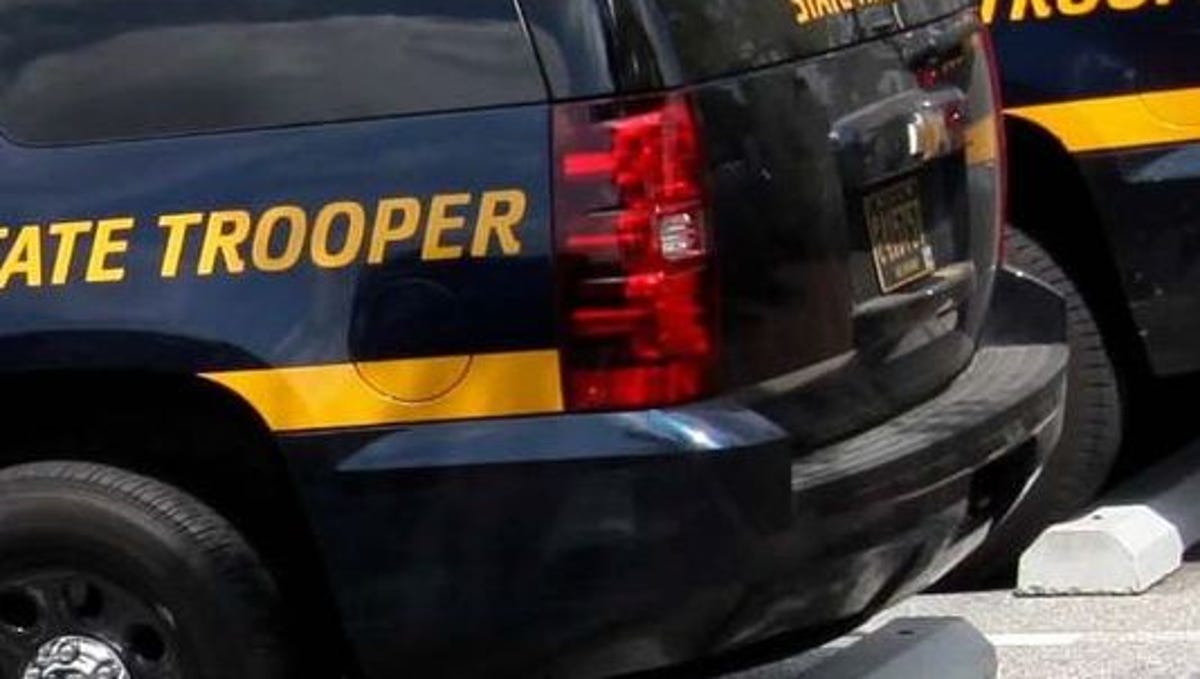Politics
California could boot thousands of immigrants from program that aids elderly and disabled

In Bell Gardens, Raquel Martinez said she has relied for nearly three years on a program that pays an assistant to help her make it safely to her frequent appointments at the MLK Medical Campus.
Martinez, 65, is blind and has cancer. If she did not have the help of her support worker, Martinez said, she would struggle to navigate the elevators and find the right office. Her assistant also helps her with groceries and other daily tasks such as housekeeping, she said, tending to her 21 hours a week.
“I was in need of a lot of help,” Martinez said in Spanish.
As budget cuts squeeze the state, California could yank such assistance from elderly, blind or otherwise disabled immigrants who have relied on the state’s In-Home Supportive Services program.
IHSS pays assistants who help people with daily tasks such as bathing, laundry or cooking; provide needed care such as injections under the direction of a medical professional; and accompany them to and from doctor’s appointments. It aims to help people remain safely in their own homes, rather than having to move into nursing facilities or suffer without needed care.
Gov. Gavin Newsom has proposed cutting immigrants in the country illegally from the IHSS program, estimating it would save California nearly $95 million as the state stares down a $44.9-billion budget deficit.
The proposed cut has outraged groups that advocate for immigrants and disabled people, which argued it would be a shortsighted move that would jeopardize Californians who need day-to-day support, put them at increased risk of deportation and ultimately drive up costs for the state.
At a recent hearing in Sacramento, Ronald Coleman Baeza called it “indefensible” for Newsom to propose “to eliminate these services for a population for no reason but for their immigration status.”
“It’s right out of Donald Trump’s playbook,” said Baeza, managing director of policy for the California Pan-Ethnic Health Network. “Without IHSS, these individuals will need costly and preventable hospital and nursing home care, and family caregivers will go without pay,” perpetuating “a generational cycle of poverty.”
In California, IHSS is open to blind, disabled and aged people on Medi-Cal, the California Medicaid program. Medi-Cal has expanded over time to include immigrants here illegally, beginning with children and eventually covering Californians of all ages. State officials emphasized that if the cut goes through, immigrants without legal status would remain eligible for Medi-Cal.
“The IHSS benefit for the undocumented population was an expansion of services,” H.D. Palmer, deputy director of external affairs for the Department of Finance, said in an email. “None of these solutions were made easily or lightly. The overall goal was to maintain core programs and base benefits” such as Medi-Cal, “in particular, Medi-Cal services regardless of citizenship status.”
The California Department of Social Services said nearly 3,000 immigrants without legal status had been authorized for IHSS. Budget officials said more than 1,500 were receiving such benefits as of earlier this year.
At a California State Senate subcommittee hearing, a Department of Social Services representative said the state agency was working with the Department of Health Care Services to see what other benefits people being jettisoned from IHSS might be able to access “to mitigate any negative impacts.”
Most of the affected people getting such assistance are 50 and older, but the program also serves children with disabilities who might otherwise need to live in facilities, advocates said.
Advocates fear that if the proposed cut is approved by state lawmakers, people in the country illegally could lose such support as soon as July. The Department of Social Services said it would issue notices at least 10 days in advance to people being cut off. Martinez, who is here illegally, hadn’t heard that IHSS could be yanked away until a reporter mentioned it.
Blanca Angulo, 62, who helps others through the local group Inmigrantes con Discapacidades — Immigrants with Disabilities — said rolling back the benefits would be “a terrible blow.”
“They don’t know the life of a disabled person because they’re not walking in our shoes,” she said in Spanish. “So for them it’s very easy to take away these services without thinking about it.”
Booting people from the program could also have reverberating effects on families, advocates said. In many cases, relatives are the ones being paid to provide care under the program. Anthony Wright, executive director of the consumer advocacy group Health Access California, called it “a double whammy.”
If a caregiver “loses income and has to potentially find other work, then who does the caregiving?” he asked. “Or they continue the caregiving, but then they have no means to meet basic needs.”
In the Hollywood area, Jose Villasana Moran worries about what losing the program would mean for his family. His husband took a pay cut from working as an assistant manager at a restaurant to serve as the IHSS caregiver for his 63-year-old mother, who is here illegally and has Alzheimer’s disease.
“My mom needs help 24/7,” Moran said. “I don’t know what we will do. … We have to dress her. We have to comb her hair, clip her nails, make her food because she cannot cook anymore.”
Putting her in a nursing home “would be the last resort,” if they could even afford it, Moran said. His late father had needed more care than they could provide and had endured shoddy care at a dirty facility, he said.
“I would not want my mom to go through that.”
Being jettisoned from the program would mean losing the income his husband had been receiving for her care, now capped at 195 hours a month, he said. Moran was determined that somehow, between the two of them, “we’re going to try to take care of my mom, even if we don’t have the money.”
But he fears other vulnerable people who are in the country illegally may be left alone without help, putting themselves and others at risk, “because family members are forced to leave the house and work.”
In Contra Costa County, Norma Garcia has been attending to her 67-year-old mother, who has dementia and needs constant care, through the IHSS program. If her mother is cut off from the program, and Garcia is no longer paid to care for her, “how am I going to buy food? How will I keep paying the bills?” she asked.
“My spouse works, but it’s not enough,” she said in Spanish. Finding another job outside their home in El Sobrante is impossible when her mother needs so much help, Garcia said.
“I can’t leave her alone for even a minute.”
Hagar Dickman, a senior attorney with the advocacy group Justice in Aging, called it “a really big inequity issue.”
“It forces a targeted population, which is the individuals who are undocumented, to either seek institutional care … or to increase impoverishment of their families,” Dickman said.
Critics also argue that any savings from ejecting people here illegally from IHSS could be outstripped by the expense of putting more of them into nursing facilities. Attorneys with Disability Rights California pointed out that the state has estimated a nursing home costs an average of $124,188 annually — far more than the average cost of roughly $28,000 for people in the country illegally on IHSS, they said.
“This looks like a classic example of ‘a penny wise, a pound foolish,’ ” Wright said. Even if only a fraction move into nursing homes, “it would still cost more money, because nursing home care is so much more costly.”
Dickman added that being pushed into a nursing facility could put immigrants at risk of losing their shot at legal status. Under the “public charge” rule, people can be blocked from getting a green card or citizenship if they are likely to become “primarily dependent” on government aid. Medi-Cal benefits do not usually factor into those decisions — but they can if someone is institutionalized for long-term care at government expense.
As it stands, Angulo said many immigrants here illegally are already afraid to use IHSS services for fear of possible consequences. “The laws are always changing,” she said in Spanish, “for good or for bad.”
At a recent hearing, a representative of the Western Center on Law & Poverty warned that the advocacy group believes the cuts would violate state and federal law, including the Americans with Disabilities Act, and said it was “exploring litigation options.”
Palmer said Newsom “respects that there will be disagreement over many of these proposals, and that other alternative approaches may be put forward in the weeks ahead as discussions with the Legislature continue.”

Politics
Park Police union says officers ‘did everything they could’ during DC anti-Israel riot

Following the protests at Union Station by anti-Israel agitators defacing federal property in protest of Israeli Prime Minister Benjamin Netanyahu’s address to Congress, a Park Police union is pushing back against criticism that only a few arrests were made.
Thousands of Hamas-sympathizing agitators descended on Washington, D.C., Tuesday, at one point defacing federal monuments with phrases in support of the terrorist group responsible for the Oct. 7 attacks in Israel, saying, “Hamas is coming.”
Twenty-three people were arrested at the protests, but some have suggested that number should have been higher.
Sen. Marco Rubio, R-Fla., posted on X, “How many more times are they going to allow leftist degenerates who support terrorism and hate America to vandalize property and attack police? There should have been hundreds of arrests today in D.C. not just 23.”
HOUSE REPUBLICANS REPLACE AMERICAN FLAGS AT UNION STATION AFTER ANTI-ISRAEL PROTESTS
The Columbus Memorial Fountain at Union Station during an anti-Israel protest on the day Israeli Prime Minister Benjamin Netanyahu addressed a joint meeting of Congress on Capitol Hill in Washington July 24, 2024. (Reuters/Seth Herald)
But the U.S. Park Police Labor Committee is pushing back.
“Our officers on the ground did everything they could to protect life and property. In fact, despite having only 29 officers available to mitigate damage — 29! — with no additional help from the Department of the Interior, we processed several arrests for charges ranging from assault on a police officer to destruction of government property,” Kenneth Spencer, chairman of the United States Park Police Fraternal Order of Police, said in a statement.
“That’s why it’s so disheartening to hear some members of Congress and members of the media, many of whom describe themselves as ‘champions’ of law enforcement, suggesting that officers gave protesters a ‘pass’ or that insufficient arrests were made.
“Nothing could be further from the truth. Anyone who truly cares to understand the problem would see that our officer staffing crisis is at the root of our agency’s mission readiness. A small unit of 29 officers arrested 10 individuals while being assaulted by a mob of thousands. We simply did not have the staffing or resources to accomplish a mass arrest operation.”
SEE IT: THE MOST DRAMATIC PHOTOS FROM WEDNESDAY’S PRO-HAMAS WASHINGTON, D.C. PROTESTS
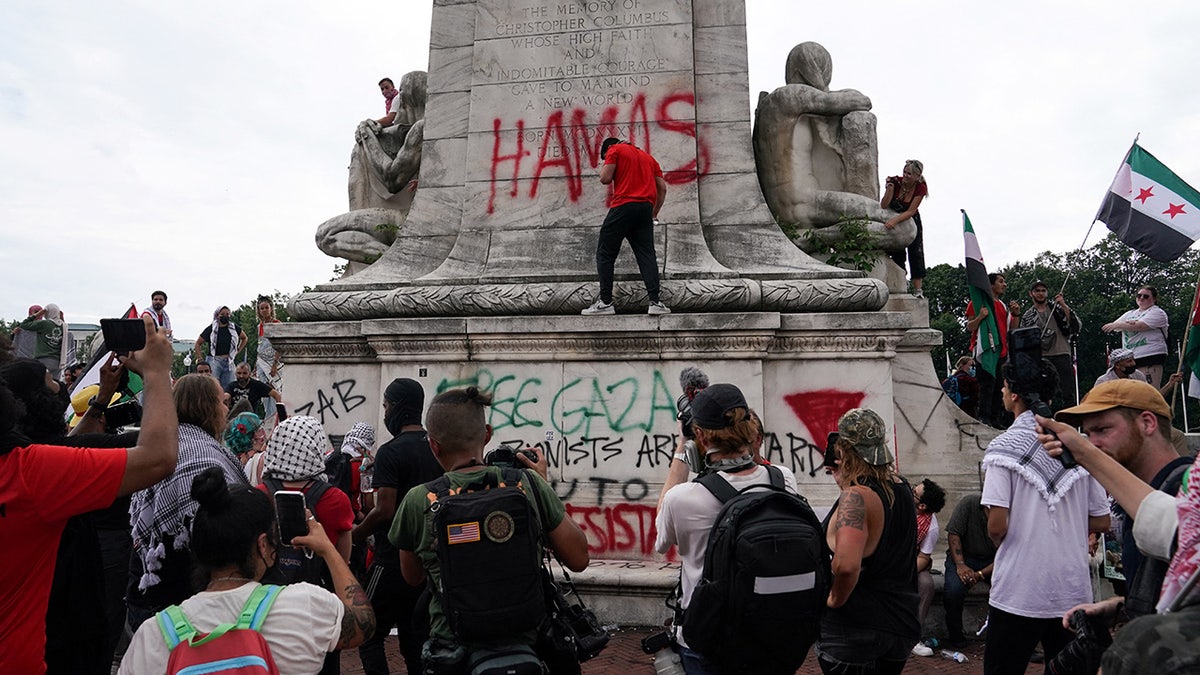
An anti-Israel demonstrator sprays graffiti on the Christopher Columbus Memorial Fountain at Union Station on the day of Israeli Prime Minister Benjamin Netanyahu’s address to a joint meeting of Congress on Capitol Hill in Washington July 24, 2024. (Reuters/Nathan Howard)
At least one demonstrator, whose face was covered, was spotted by Fox News carrying what appeared to be the flag of the terrorist group Hamas while others were heard shouting “Allahu Akbar.”
KAMALA HARRIS REACTS TO ANTI-ISRAEL RIOTS AT DC’S UNION STATION
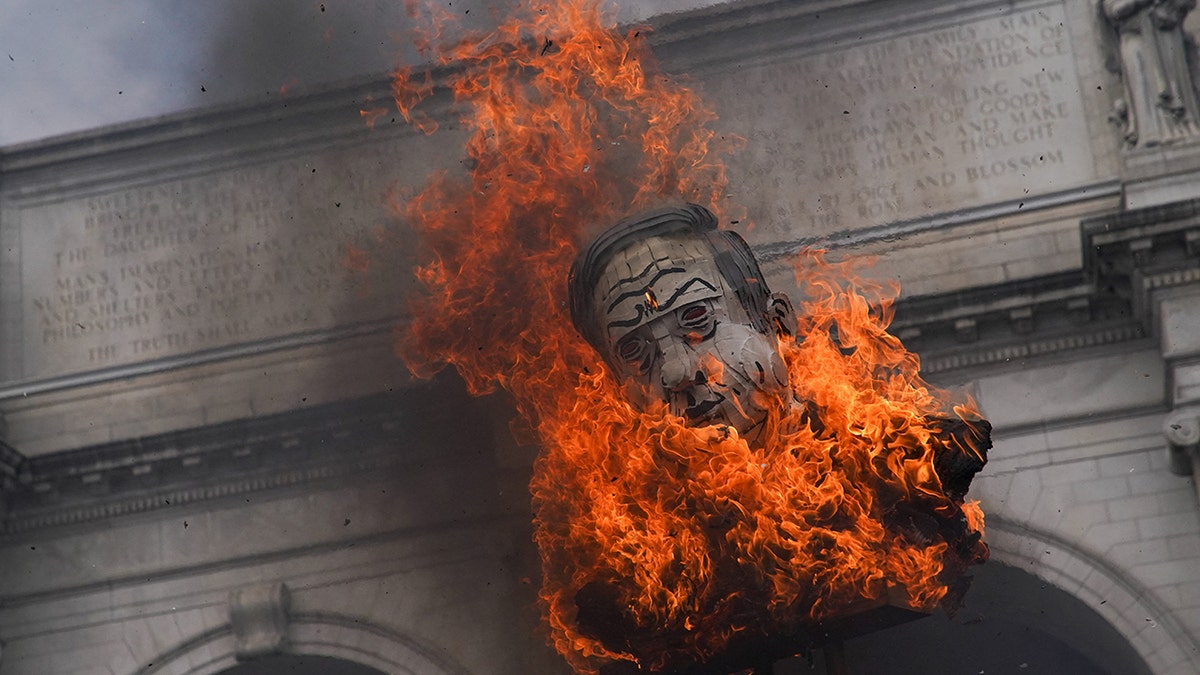
Anti-Israel demonstrators burn an effigy depicting Israeli Prime Minister Benjamin Netanyahu outside Union Station on the day of Netanyahu’s address to a joint meeting of Congress on Capitol Hill in Washington July 24, 2024. (Reuters/Nathan Howard)
The White House condemned the protests Wednesday evening, calling the chaos “disgraceful.”
“Identifying with evil terrorist organizations like Hamas, burning the American flag or forcibly removing the American flag and replacing it with another is disgraceful,” White House spokesperson Andrew Bates said in a comment to Fox News Digital Wednesday evening.
Politics
Ali: Kamala Harris has a campaign soundtrack: Beyoncé's 'Freedom'
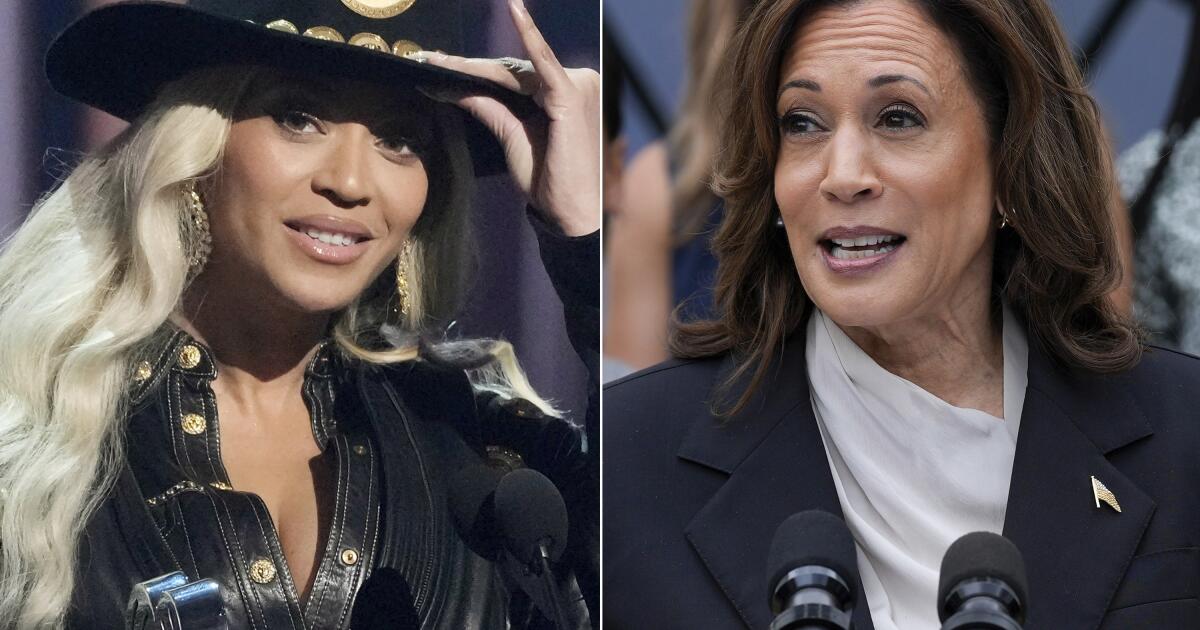
Vice President Kamala Harris’ bid for the presidency has a soundtrack: Beyoncé’s “Freedom.”
The leading Democratic presidential candidate took the stage in her first visit to her Wilmington, Del. campaign headquarters and again during her first campaign rally in Wisconsin as the song played.
Now the cathartic anthem graces Harris’ first campaign ad, in which she says: “There are some people who think that we should be a country of chaos, of fear, of hate. But us? We choose something different: We choose freedom.”
Pit that against the musical number her competitor chose for his grand entrance on Night 3 of the Republican National Conference. Donald Trump walked out to James Brown’s “It’s a Man’s, Man’s, Man’s World,” a tone-deaf choice for a former president found liable for sexual abuse, who’s bragged about sexually assaulting women, a married man who paid hush money to a porn star and a former president who rolled back women’s reproductive rights 50 years with the repeal of Roe vs. Wade.
Maybe the Godfather of Soul would have endorsed Trump’s usage of his song, but Brown would be breaking with decades’ worth of musicians who’ve decried GOP candidates playing their tracks at rallies and booster events. Adele, Rihanna, R.E.M., the Rolling Stones, Prince, Neil Young, Guns N’ Roses and Queen are among the many artists who’ve spoken out against Trump using their tunes for campaign purposes.
Heart bristled when the McCain-Palin campaign used “Barracuda.” Tom Petty insisted George W. Bush back away from “I Won’t Back Down.” Bruce Springsteen decried Ronald Reagan’s appropriation of “Born in the U.S.A.”
Beyoncé, however, gave Harris her blessing to use “Freedom,” a single from her 2016 blockbuster album “Lemonade.” The song, which features guest rapper Kendrick Lamar, is an explosive expression of empowerment. At the time of its release, it spoke to public outcry around police killings of unarmed Black men and women — Eric Garner, Tamar Rice, Freddie Gray — and protests that were largely fueled by the ire of younger generations.
Whether Beyoncé was singing about the tyranny of a cheating spouse or racial injustice (or both), the song became an anthem for a new, potentially potent block of the American electorate.
For the first time, Gen Z and millennials could now account for as many votes as baby boomers and their elders, groups that have made up a majority of the electorate for decades.
Folks under 40 have grown up with Beyoncé and her ubiquitous work. Think of Beyoncé like the Who for boomers — their work is everywhere (Republican Sen. Rand Paul played the band’s anti-war hit “Baba O’Riley” when he campaigned in 2015) — or Nirvana for Gen X, except no one cares what we think. Whatever, nevermind.
The Harris campaign’s smart choice of music coincides with a willingness to lean into a meme culture that shot up organically around the 59-year-old VP since President Biden announced Sunday that he was dropping out of the race.
Pop star Charli XCX showed her support for Harris when she tweeted “Kamala IS brat.” The British singer is referring to the TikTok and Twitter edits of Harris’ image superimposed to songs from Charli XCX’s hit album “Brat.” The avalanche of memes come from a video clip in which Harris talks about her mother’s response to the hubris of youth: “You think you just fell out of a coconut tree? You exist in the context of all in which you live and what came before you.”
Right-wing social media used the quote to deride Harris as inarticulate and a “word salad” master, but liberal swaths of Gen Z have since reworked the clip into emojis and memes that celebrate Harris’ nonconformist approach. She’s become a viral sensation, in a good way, unlike J.D. Vance’s damning “single cat lady” memes and a cringey internet joke about encounters with couches.
It’s rare that relevant talent will shill for a Republican candidate. Case in point: Trump’s pop culture ambassadors at this year’s RNC were Kid Rock, Kanye’s ex Amber Rose and former WWE wrestler Hulk Hogan, whose big moment was ripping his shirt off and screaming “Let Trump mania run wild!”
Harris chose to let freedom ring, and she has Queen Bey behind her.
Politics
Texas sues Biden administration over program giving birth control to teens without parents' knowledge

Texas officials are challenging a recent order from President Biden’s administration that would allow schools to distribute birth control to teenagers without parental consent.
Texas Attorney General Ken Paxton announced Thursday that his office is suing the Biden administration over their 2021 change to Title X guidelines banning parental consent requirements for birth control services.
“By attempting to force Texas healthcare providers to offer contraceptives to children without parental consent, the Biden Administration continues to prove they will do anything to implement their extremist agenda — even undermine the Constitution and violate the law,” Paxton said in a statement.
TRUMP SAYS HE ‘WILL NEVER ADVOCATE IMPOSING RESTRICTIONS ON BIRTH CONTROL’ OR OTHER CONTRACEPTIVES
A woman takes the next pill from a monthly pack of contraceptive pills. (Annette Riedl/picture alliance via Getty Images)
The Texas legal battle began in Dec. 2021 when US District Judge Matthew Kacsmaryk ruled that Title X — the federal program that provides free, confidential contraception to anyone regardless of age, income or immigration status — violates parental rights and violates state and federal laws.
The case was argued by former solicitor general of Texas Jonathan Mitchell, representing father Alex Deanda, who said he was “raising each of his daughters in accordance with Christian teaching on matters of sexuality, which requires unmarried children to practice abstinence and refrain from sexual intercourse until marriage.”
SCHUMER PLANS VOTE ON ‘CONSTITUTIONAL RIGHT TO CONTRACEPTION’ IN BID TO PROTECT SENATE DEMOCRAT MAJORITY
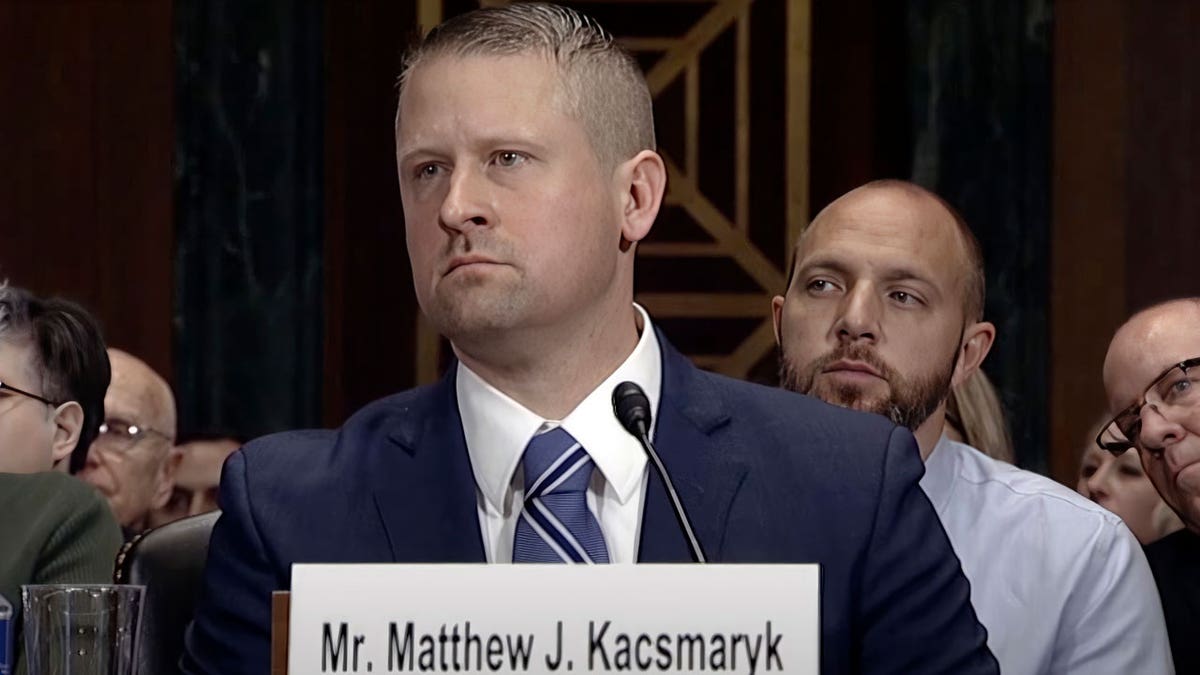
Kacsmaryk, a Trump appointee, previously ruled that parents must be informed when birth control is provided to their children under 18 years old. (Senate Judiciary Committee via AP)
In response, the federal government updated guidelines to state that Title X projects “may not require consent of parents or guardians for the provision of services to minors, nor can any Title X project staff notify a parent or guardian before or after a minor has requested and/or received Title X family planning services.”
Paxton is now seeking a permanent injunction on this rule, which he claims defies the findings of the federal court.
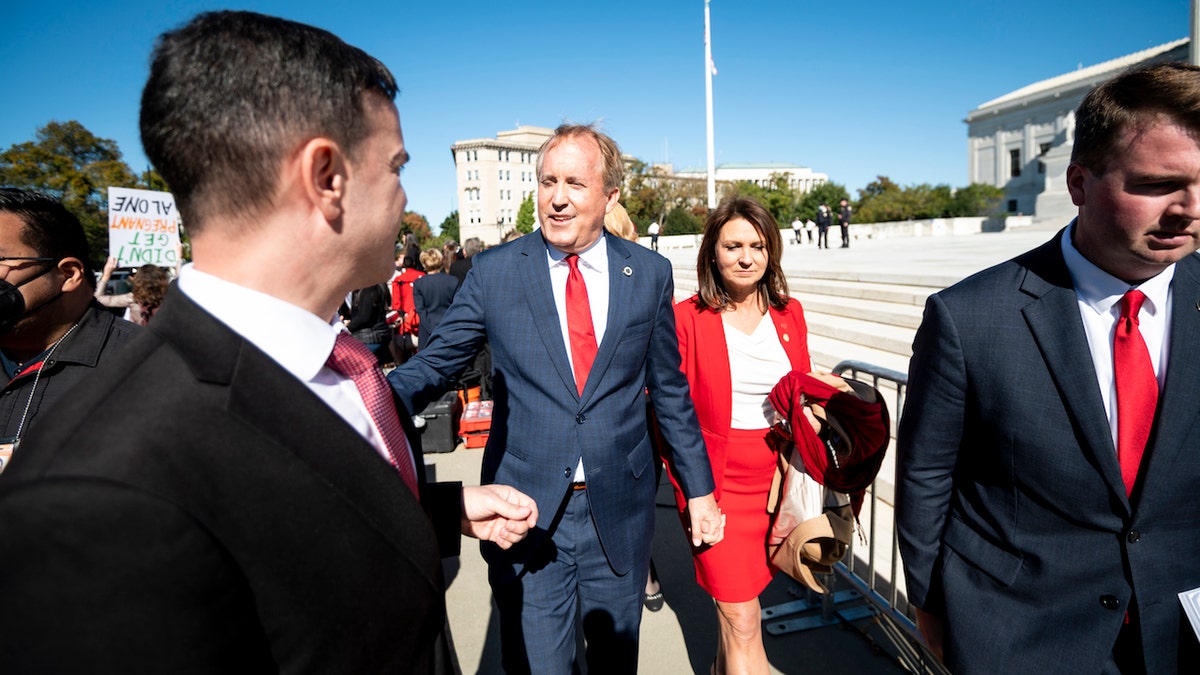
Paxton and his wife Angela are pictured outside the Supreme Court. (Bill Clark/CQ-Roll Call, Inc via Getty Images)
Paxton filed the lawsuit in a federal court in Amarillo. It will likely be heard by Kacsmaryk, the same judge who previously ruled parents must be informed of birth control provided to their children.
-

 World1 week ago
World1 week agoOne dead after car crashes into restaurant in Paris
-

 Midwest1 week ago
Midwest1 week agoMichigan rep posts video response to Stephen Colbert's joke about his RNC speech: 'Touché'
-

 News1 week ago
News1 week agoVideo: Young Republicans on Why Their Party Isn’t Reaching Gen Z (And What They Can Do About It)
-

 Movie Reviews1 week ago
Movie Reviews1 week agoMovie Review: A new generation drives into the storm in rousing ‘Twisters’
-

 News1 week ago
News1 week agoIn Milwaukee, Black Voters Struggle to Find a Home With Either Party
-

 Politics1 week ago
Politics1 week agoFox News Politics: The Call is Coming from Inside the House
-

 News1 week ago
News1 week agoVideo: J.D. Vance Accepts Vice-Presidential Nomination
-

 World1 week ago
World1 week agoTrump to take RNC stage for first speech since assassination attempt


